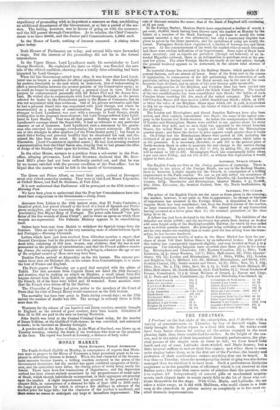Both Houses of Parliament sat today, and several bills were
forwarded a stage. But the interest of the proceedings did not lie in the formal transactions.
In the Upper House, Lord Lyndhurst made his surrejoinder to Lord George Bentinck. He explained the facts on which was founded the new tale of the offered coalition; showing that a totally false colouring had been imparted by Lord George-
- When the late Government retired from office, it was known that Lord Lynd- hurst was no longer a candidate for official appointment. He therefore thought his position favourable to the task which he undertook, that of endeavouring to effect a reconciliation between the severed portions of the Conservative party; as he could no longer be suspected of having a personal object in view. For that purpose he communicated personally with Sir Robert Peel and Sir James Gra- ham. He wished also to communicate with Lord George Bentinck, as the person selected for leader by the Protectionist party in the House of Commons; but he was not acquainted with that nobleman. One of his private secretaries said that he had a personal friend who was acquainted with Lord George, and whom he recommended as a medium of communication. That gentleman, who was a stranger to Lord Lyndhurst, was sent with a message to Lord George, simply inviting him to the proposed reconcilement; but Lord George referred Lord L d- burst to Lord Stanley. That was all that passed. Nothing was said in Lord Lyndhurst's message about the Sugar-bill; it had no reference to any particular measure or set of measures. Lord Lyndhurst read a statement by the gentle- man who conveyed his message, corroborating his present statement. He made one or two attempts in other quarters [of the Protectionist party]; but found so much bitter feeling and personal hostility that he abandoned the task and dis- missed the idea from his mind. He made no secret of it—he told it to Lord Clarendon. [Lord CLARENDON signified assent.] He had that morning received weonununication from the Chief Baron also, denying that he had pressed the office of Judge of the Bombay Court upon his brother, Mr. Pollock.
In the other House, apropos to a petition from a sub-sorter in the Post- office, alleging grievances, Lord JOHN RH88E1.1.. declared that Mr. Row- land Hill's plans had not been sufficiently carried out, and that he was by no means satisfied with the present condition of the Post-office: but he hoped that the matter would be left in the hands of Government.


























 Previous page
Previous page